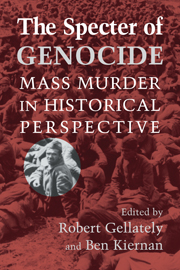Book contents
- Frontmatter
- Contents
- List of Contributors
- Acknowledgments
- INTRODUCTION
- PART I GENOCIDE AND MODERNITY
- PART II INDIGENOUS PEOPLES AND COLONIAL ISSUES
- PART III THE ERA OF THE TWO WORLD WARS
- PART IV GENOCIDE AND MASS MURDER SINCE 1945
- 13 “When the World Turned to Chaos”
- 14 Genocide in Cambodia and Ethiopia
- 15 Modern Genocide in Rwanda
- 16 History, Motive, Law, Intent
- 17 Analysis of a Mass Crime
- CONCLUSIONS
- Appendix: Convention on the Prevention and Punishment of the Crime of Genocide
- Index
17 - Analysis of a Mass Crime
Ethnic Cleansing in the Former Yugoslavia, 1991–1999
Published online by Cambridge University Press: 05 June 2012
- Frontmatter
- Contents
- List of Contributors
- Acknowledgments
- INTRODUCTION
- PART I GENOCIDE AND MODERNITY
- PART II INDIGENOUS PEOPLES AND COLONIAL ISSUES
- PART III THE ERA OF THE TWO WORLD WARS
- PART IV GENOCIDE AND MASS MURDER SINCE 1945
- 13 “When the World Turned to Chaos”
- 14 Genocide in Cambodia and Ethiopia
- 15 Modern Genocide in Rwanda
- 16 History, Motive, Law, Intent
- 17 Analysis of a Mass Crime
- CONCLUSIONS
- Appendix: Convention on the Prevention and Punishment of the Crime of Genocide
- Index
Summary
We know it: Man is reasonable. But what about men?
Raymond AronSince Raphael Lemkin's pioneer work, several scholars have published comparative studies on genocides. The works of Leo Kuper, Helen Fein, Frank Chalk and Kurt Jonassohn are among the best known. However, they have not been able to agree on a definition of the concept of genocide. Researchers go from a sweeping approach – such as the one favored by the Encyclopedia of Genocide – to a more restricted one, based on the United Nations 1948 Convention on the Prevention and Punishment of the Crime of Genocide, favored by Ben Kiernan, the founder of the Genocide Studies Program at Yale University.
Considering that the UN definition is both too narrow and too restrictive, other scholars have introduced new terminology, such as “politicide” or “democide.” The 1990s saw a growing number of comparative studies on “massacres” that distanced themselves from former studies on genocides: among them, the works of Brenda Uekert, Denis Crouzet, Mark Levene, Stahtis Kalivas, Luis Martinez, and myself. In some of them, the dividing line between “genocide” and “massacre” disappeared, leading such authors as Brenda Uekert or Yves Ternon to use the expression “genocidal massacres.” In addition, Mark Levene gave a definition of “massacre” that is close to the definition of “genocide” given by other scholars, that is, “one-sided killings.”
And yet, it is essential that the words “massacre” and “genocide” be clearly and precisely differentiated, if only for one reason, that “genocide” comes under international law.
- Type
- Chapter
- Information
- The Specter of GenocideMass Murder in Historical Perspective, pp. 353 - 370Publisher: Cambridge University PressPrint publication year: 2003
- 1
- Cited by

